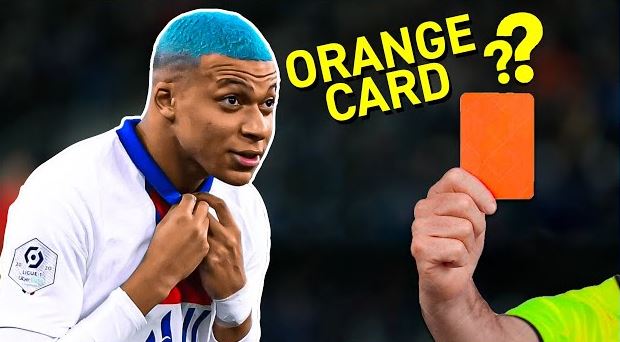Football’s governing body is planning to introduce a new orange card as a new punishment, but it will be issued without being seen directly by fans.
Premier League stars could face 10 minutes of sitting outside the pitch (sin-bin) to serve their punishment given by the referee, for misconduct, including words or actions of fighting. A foul that does not deserve to be out of the game directly (red card). under the new rule that could start to be used as early as the 2023/24 season.
The International Football Association Board (IFAB) has reached an initial agreement to trial the penalty in various competitions around the world, including the Premier League. The rule, which is used in other sports such as rugby and handball.
Last month, IFAB stressed that fighting behavior is the “main reason” for matches to be frequently interrupted.
The rule could also be used to punish tactical fouls, such as the one made by Giorgio Chiellini of Italy when he pulled the shirt of England’s Bukayo Saka in the Euro 2020 final until he could no longer run again when he was about to launch an attack.
But the incident was decided for the player to be shown a yellow card, which angered the fans of the Three Lions. Now with this new rule, Chiellini would have been given a “orange card” and sat out for 10 minutes.
The rule states; “In certain circumstances, such as opposition, if a player disrespects the referee, the referee may send him to the ‘sin-bin’ for ten minutes.”
Also, in other cases, such as tactical fouls, “the referee will be able to send the player to the sin-bin.”
Analysis
The introduction of an orange card is a significant change to the rules of football. It is designed to address the issue of misconduct, which can often lead to disruption of matches.
The new rule is likely to be met with mixed reactions. Some fans may welcome it as a way to crack down on bad behavior. Others may argue that it is too harsh and that it could lead to unfair decisions by referees.
Only time will tell whether the orange card is a success. However, it is clear that IFAB is committed to improving the behavior of players in the game.
Potential benefits of the orange card
The orange card could have a number of benefits, including:
- Reduced disruption of matches: The 10-minute sin-bin would be a more effective punishment than a yellow card, which often leads to players continuing to play in the match. This could lead to fewer stoppages in play and a more fluid game.
- Increased respect for referees: The sin-bin could help to deter players from disrespecting referees. This could create a more positive atmosphere around matches and make the game more enjoyable for fans.
- Reduced number of tactical fouls: The orange card could be used to punish tactical fouls, such as those committed to prevent a clear goal-scoring opportunity. This could lead to a more open and attacking game.
Potential drawbacks of the orange card
The orange card could also have a number of drawbacks, including:
- Unfair decisions by referees: The decision of whether to issue an orange card is subjective and could lead to unfair decisions by referees. This could damage the reputation of the game and lead to protests from fans.
- Increased number of injuries: Players who are sent to the sin-bin may be more likely to get injured when they return to the game. This is because they will be tired and out of rhythm.
- Lack of clarity: The rules surrounding the orange card are still being developed and it is not yet clear how they will be applied in practice. This could lead to confusion and controversy.
Overall, the introduction of an orange card is a significant change that could have a major impact on the game. It is important to weigh the potential benefits and drawbacks of the rule before it is implemented

